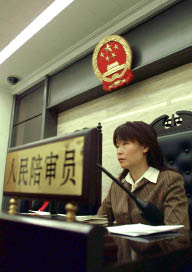Breakthroughs in Judicial Reform
- By Jiao Feng
 0 Comment(s)
0 Comment(s) Print
Print E-mail China Today, February 27, 2014
E-mail China Today, February 27, 2014
|
|
| The people's juror system was launched in Beijing in 2005. |
Human Rights Better Guaranteed
On December 28, 2013, the Standing Committee of the 12th National People's Congress (NPC) passed at its sixth meeting the decision to repeal the legal provisions on re-education through labor, putting a stop to a system that lasted half a century.
The re-education through labor system was an administrative measure to carry out compulsory education and reformation of detainees. In 1957 and 1979, the standing committee of the NPC approved the State Council's Decision on Re-education through Labor and the Supplementary Regulations on Re-education through Labor respectively. Governments in provinces, autonomous regions, municipalities and big and medium-sized cities established special committees on re-education through labor, that consisted of heads of civil affairs, public security and labor departments, to examine and approve a course of re-education through labor. The administrative bodies of judicial offices would then execute the decision and the procuratorial office would carry out legal supervision of the activities. The people under the scheme were able to safeguard their legitimate rights and interests by applying for administrative reconsideration and administrative litigation. Upon the foundation of the People's Republic of China and during the early days of reform and opening-up, the system filled in the gaps between criminal law and administrative law. Through re-education it administrated illegal actions that didn't violate criminal law, thereby playing a role in maintaining social stability.
However, the system makes it possible to deprive people of basic rights without a judicial trial. Detainees were sent directly to detention centers for as long as four years of re-education through labor. The system was widely and seriously abused in practice. Its abolishment hence won immediate acclaim among the public, who hailed it as "a historic decision," a key step taken by China in protecting human rights.
The Third Plenary Session of the 18th CPC Central Committee also put forward a series of requirements to improve the judicial system in terms of human rights. These included improving the mechanism of preventing, correcting and accounting for misjudged cases, forbidding the use of torture and corporal punishment to extort confessions, implementing the exclusionary rule of illegally obtained evidence, and gradually reducing the scope of accusations carrying the death penalty. The Supreme Court went on to publish Opinions on Establishing and Improving the Working Mechanism of Preventing Misjudgment of Cases, which holds that for cases with insufficient evidence, the principle of "innocent until proven guilty" should be followed.
In 2013, the judicial offices corrected a batch of misjudged cases. "The legal institution aims to guarantee the rights of citizens. The re-education through labor program deprives freedom without a trial, which is contrary to the spirit of rule by law," Cao commented. "Abolishing the system is a major action towards the protection of human rights and presses administrative departments to improve their capabilities on social management."







Go to Forum >>0 Comment(s)